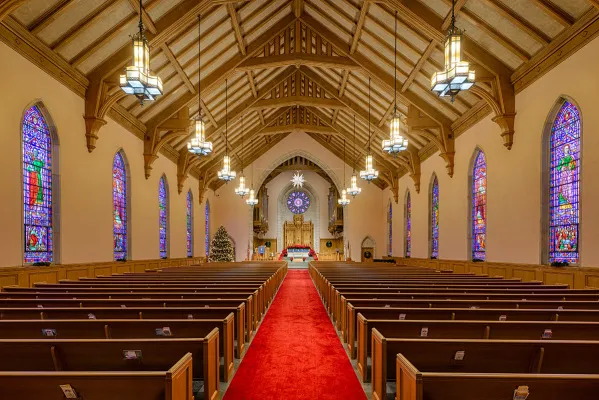What is Pentecost Sunday?
Pentecost Sunday is a significant event in the Christian liturgical calendar, commemorating the descent of the Holy Spirit upon the apostles and followers of Jesus Christ, as described in the Book of Acts (Acts 2:1-4). Occurring fifty days after Easter Sunday, Pentecost is often referred to as the ‘birthday of the Church’ due to the rapid growth of Christianity that followed this event.
On this day, Christians gather in their churches to celebrate the coming of the Holy Spirit, an experience marked by miraculous signs and the ability of the apostles to speak in various tongues. The event signifies not only the empowerment of the apostles to spread the teachings of Jesus but also the theological belief that the Holy Spirit continues to guide and inspire believers today.
Why Do Some Churches Celebrate Pentecost and Others Don’t?
The celebration of Pentecost varies among Christian denominations. Here are some of the reasons why churches might differ in their recognition of this important day:
1. Liturgical Calendars
Some churches, particularly those in the liturgical traditions (such as Roman Catholic, Orthodox, Anglican, and Lutheran), follow a structured church calendar that includes significant feasts and events. These traditions observe Pentecost as a major holy day. They incorporate it into their worship with special readings, hymns, and activities such as confirmation ceremonies and baptism.
2. Non-Liturgical Churches
Meanwhile, many non-liturgical churches, particularly those from the evangelical or charismatic traditions, may not formally observe Pentecost or place as much emphasis on it. While they still recognize the importance of the Holy Spirit in their lives, they may focus more on spontaneity in worship and may not have a structured observance for specific days in the church calendar.
3. Theological Emphasis
Different denominations have varying theological interpretations of the Holy Spirit’s role. Some churches emphasize the Acts of the Apostles as a historical event that should inspire contemporary believers, while others may prioritize personal experiences with the Holy Spirit over commemorating a specific day.
4. Cultural Context
In cultures where Christianity is less institutionalized, the celebration may take the form of personal or community gatherings rather than formal church services. This can lead to a diverse understanding and observance of Pentecost based on cultural expressions.
5. Focus on Other Events
Some churches may also place greater importance on other events in the church calendar, such as Triune celebrations, confirmations, or the Feast of the Ascension, which takes place 40 days after Easter. For these communities, Pentecost might take a backseat to these other significant observances.
Pentecost and the Priesthood
Pentecost is intrinsically linked to the themes of priesthood and ministry. The priesthood, particularly in the Catholic tradition, is seen as a continuation of Jesus’s ministry, ushered in with the arrival of the Holy Spirit on Pentecost.
In the New Testament, the Holy Spirit empowers believers to serve, heal, and minister to others. This empowerment is also pertinent to the priesthood, as priests accept the vocation of serving God’s people, echoing the call of the apostles who were filled with the Holy Spirit to spread the Gospel message.
The sacraments of ordination, particularly in the Catholic Church, highlight the roles of priests as leaders of the community, facilitators of worship, and conduits of grace. During Pentecost, the connection between the sacramental life of the church and the ongoing work of the Holy Spirit becomes particularly apparent, emphasizing the church’s mission to evangelize and minister in the world.
Pentecost Sunday Reflection with Canon Robin Gibbons: 8th June 2025
As we look to Pentecost Sunday on June 8th, 2025, Canon Robin Gibbons has shared profound thoughts on the significance of this celebration. In his reflection, Gibbons highlights the themes of renewal, empowerment, and community.
Restoration and Renewal: Gibbons speaks about Pentecost as a time of restoration where individuals come together to celebrate the transformation that the Holy Spirit brings into their lives. The day urges believers to reflect on personal journeys and the ways they can change for the better.
Empowerment for Mission: Canon Gibbons emphasizes that Pentecost is not only about celebrating the past but also about looking to the future. The story of Pentecost is a call for believers to embrace the empowerment of the Holy Spirit. He encourages everyone to consider how they can take that spirit of empowerment and utilize it in their daily lives, within their own communities, and in broader societal contexts.
Community and Discipleship: Another crucial point of reflection Gibbons brings forth is the essence of community. Pentecost exemplifies the importance of coming together as a united body of believers. He underscores that in a world filled with division, the message of Pentecost is one of hope and unity. By working together and supporting one another, Christians can fulfill their mission of discipleship.
Conclusion
Pentecost Sunday serves as a powerful reminder of the birth of the Church and the vital role of the Holy Spirit in the life of believers. While its observance may vary among different Christian traditions, the underlying message remains consistent: the Holy Spirit inspires and empowers us to live out our faith actively and compassionately. As we approach Pentecost 2025, may we all take the time to reflect on the gift of the Holy Spirit and consider how we can be agents of change, love, and unity in our communities.







